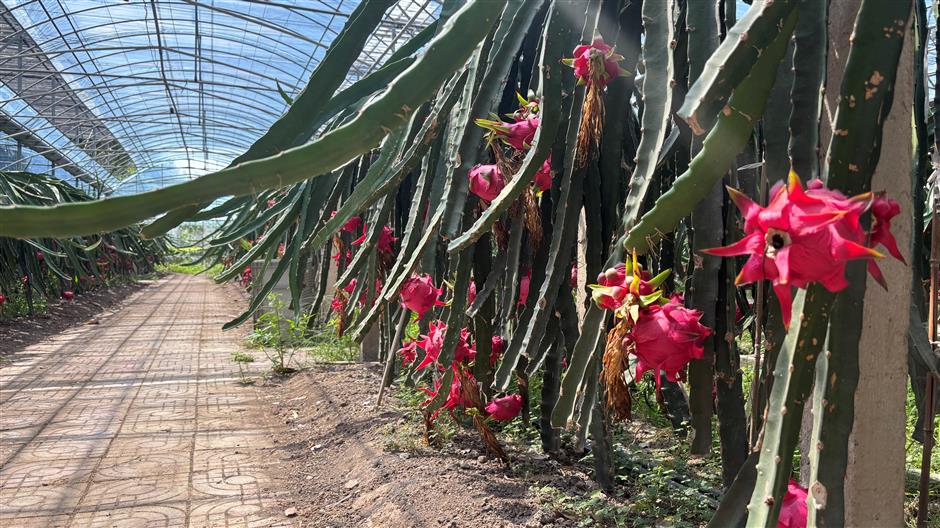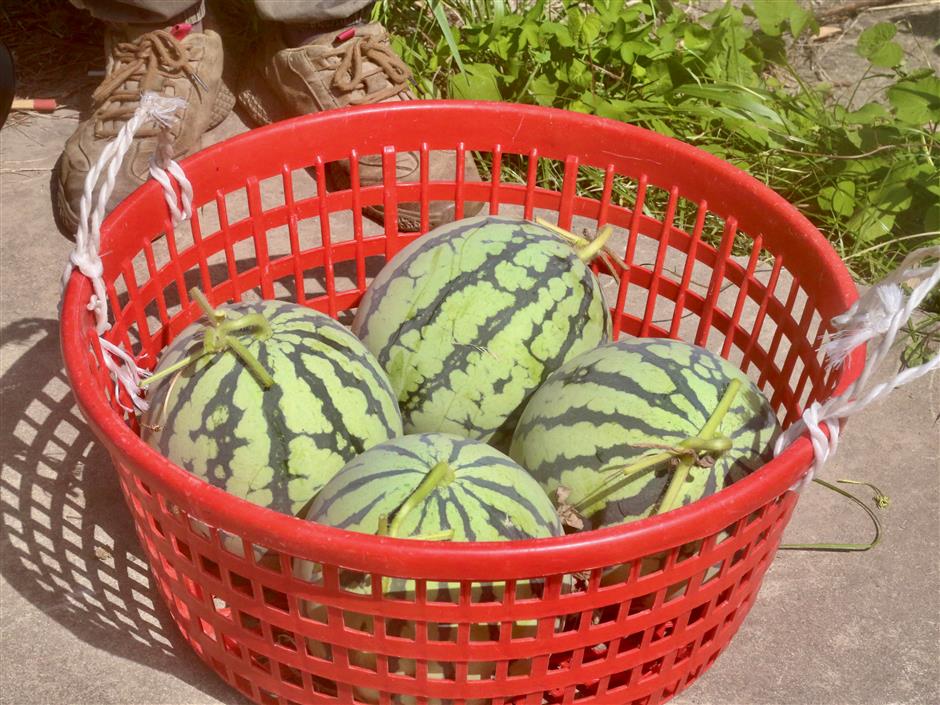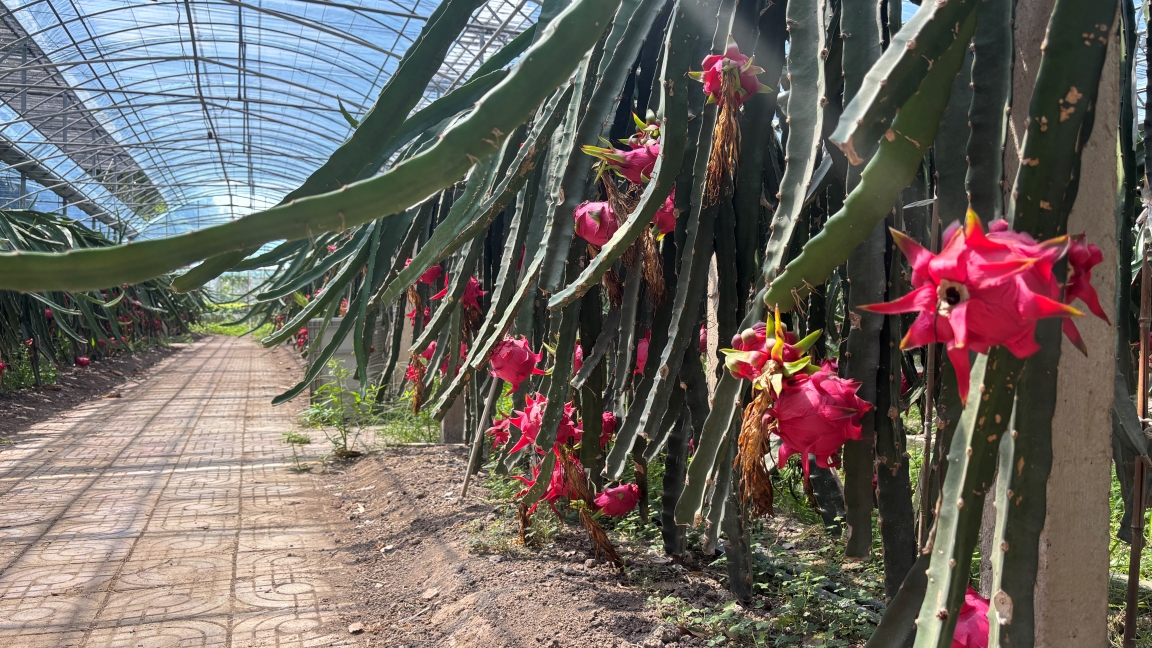
As urban residents seek escapes into nature, orchards around Jiading District are opening their fields for fruit-picking, offering grapes, pears, persimmons and kiwifruit at their seasonal best.
Visitors can enjoy hands-on harvest experience while savoring the freshness of local produce.
At Juyang Vineyard in Anting Town, clusters of grapes glisten in purple and green, with varieties such as Zuijinxiang and Huangmi reaching sugar levels as high as 22 degrees, according to cooperative manager Sun Xiaodong.
Nearby, the Baitkey eco farm is wrapping up its honey pear harvest. Persimmons are expected to be ready for picking from late September through mid-October, while other pear varieties, including Cuiguan and Yali, remain available.

Dragon fruit
Jiading is expanding its seasonal offerings with a surprising newcomer – dragon fruit.
Once grown mainly in tropical regions, the crop has taken root in suburban Shanghai thanks to advances in modern agriculture, with this summer marking a bountiful harvest of the locally cultivated fruit.
At Hongtai Orchard, farmers began early morning harvests this week, filling baskets with ripe red dragon fruit hanging from cactus-like vines. Unlike imported varieties often picked early for transport, the local fruit ripens fully on the plant, giving it richer sweetness and fresher texture.
The orchard has dedicated nearly 2 mu (about 0.3 acres) to Hongxin No. 5, a premium red-fleshed variety developed by the Guangxi Academy of Agricultural Sciences.
To ensure quality, growers use organic fertilizers, thin flowers and fruits to control yields, and maintain each plant with just one fruit per branch. This careful management keeps sugar content above 13 degrees while producing larger, juicier fruit.
Local residents have welcomed the harvest enthusiastically. "I never imagined dragon fruit grown in Jiading could taste this sweet," said Zhang, a Shanghai resident, after sampling freshly picked fruit. "It's so much better than what I usually buy online – fresh, sweet, and comforting."
Currently, Jiading hosts four cooperatives cultivating dragon fruit across about 20 mu. With each batch taking around 40 days to ripen, local farms can produce six to eight harvests annually, adding diversity to the district's fruit industry and boosting agritourism.

Yuexia watermelon
Jiading is expanding its seasonal offerings with a surprising newcomer – dragon fruit.
Once grown mainly in tropical regions, the crop has taken root in suburban Shanghai thanks to advances in modern agriculture, with this summer marking a bountiful harvest of the locally cultivated fruit.
At Hongtai Orchard, farmers began early morning harvests this week, filling baskets with ripe red dragon fruit hanging from cactus-like vines. Unlike imported varieties often picked early for transport, the local fruit ripens fully on the plant, giving it richer sweetness and fresher texture.
The orchard has dedicated nearly 2 mu (about 0.3 acres) to Hongxin No. 5, a premium red-fleshed variety developed by the Guangxi Academy of Agricultural Sciences.
To ensure quality, growers use organic fertilizers, thin flowers and fruits to control yields, and maintain each plant with just one fruit per branch. This careful management keeps sugar content above 13 degrees while producing larger, juicier fruit.
Local residents have welcomed the harvest enthusiastically. "I never imagined dragon fruit grown in Jiading could taste this sweet," said Zhang, a Shanghai resident, after sampling freshly picked fruit. "It's so much better than what I usually buy online – fresh, sweet, and comforting."
Currently, Jiading hosts four cooperatives cultivating dragon fruit across about 20 mu. With each batch taking around 40 days to ripen, local farms can produce six to eight harvests annually, adding diversity to the district's fruit industry and boosting agritourism.
Meanwhile, as of early August, the district's Hami melon base had successfully transplanted its first batch of seedlings.
The plants, which are expected to mature in late September, include 52 hybrid watermelons, 34 Hami melon varieties and 12 netted melon hybrids. Officials are confident that the region will experience a strong harvest, supported by thorough pre-planting preparations, such as drip irrigation and soil protection through plastic films.
However, melon farming in the area has faced persistent challenges, which has impacted yield stability and fruit quality. To mitigate this, staff have upgraded the greenhouses with pest-proof nets and installed buffer zones to prevent the spread of harmful insects, significantly reducing viral impact.
In addition, the Jiading agricultural team has been focusing on developing more resilient melon varieties, with the Yuexia showing promising results.

